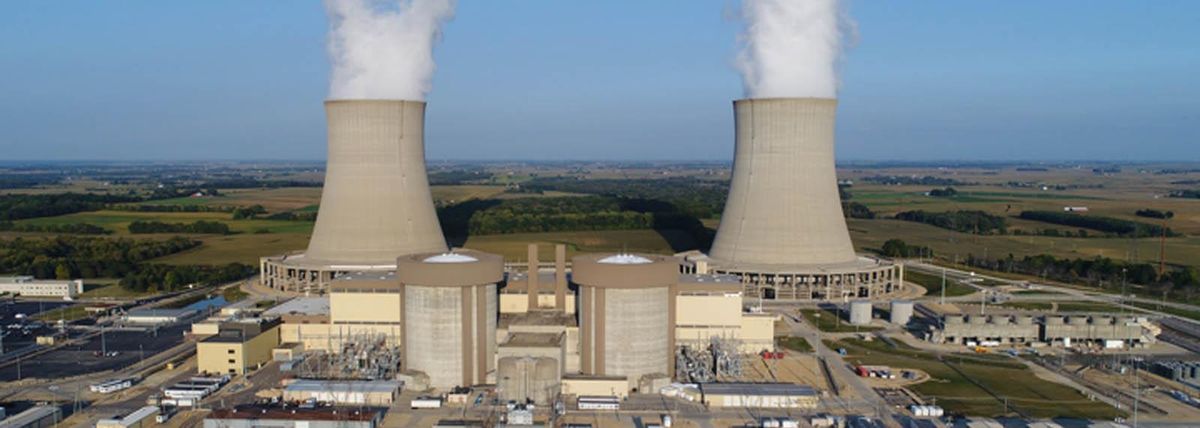Nuclear plants saved in energy plan set to go to Pritzker
The Clean Energy Jobs Act provides a $700 million subsidy to Exelon with the idea of saving jobs and the large amount of carbon-free energy the plants already produce.

By JOHN O'CONNOR | AP Political Writer
SPRINGFIELD, Ill. (AP) — Two Illinois nuclear plants would be saved from closure and carbon-emitting coal plants closed during the next quarter-century as part of a clean-energy package the Senate approved Monday and which next moves to Gov. J.B. Pritzker, who has pushed for a carbon-free Illinois by 2045.
With just one vote over the minimum necessary, the 37-17 tally in the chamber controlled by Democrats came on the same day energy company Exelon had threatened to begin shutting down its nuclear-power generating station in Byron as unprofitable, with the Dresden generating site in Morris to follow this fall. But the Clean Energy Jobs Act provides a $700 million subsidy to Exelon with the idea of saving jobs and the large amount of carbon-free energy the plants already produce.
"The state of Illinois is making history by setting aggressive standards for a 100% clean energy future," Pritzker said in a post-vote statement. "After years of debate and discussion, science has prevailed and we are charting a new future that works to mitigate the impacts of climate change here in Illinois."
In addition to the nuclear-power subsidy, the legislation, sponsored by Sen. Michael Hastings, a Tinley Park Democrat, includes provisions for closing coal-burning plants in central and southwest Illinois, investing in renewable energy such as wind and solar and offering $4,000 rebates on electric-vehicle purchases. Pritzker wants 1 million electric cars on roads by 2030.
"We refused to accept anything but the best for Illinois in terms of a clean energy future," Hastings said. "Our work product is one that is renewable, reliable and affordable for all Illinoisans."
Plants producing greenhouse gases by burning coal must cut those emissions by 45% by 2035 and close permanently by 2045.
Notably, that provision affects two large coal plants, municipally owned City Water, Light & Power in Springfield and the Prairie State Generating Co. in Marissa, 41 miles (66 kilometers) southeast of St. Louis.
Republicans noted the rule applies only to plants generating more than 25 MW of power, leaving untouched coal-burning plants at several major universities and state-owned buildings.
They also complained that the $4,000 rebate on the purchase of an electric car would not be available to anyone outside of the metropolitan area. Hastings said the rebate is available in areas where an alternative fuels surcharge is collected to cover the rebates. But Chicago Democratic Rep. Marcus Evans, who sponsored the legislation in the House, said everyone statewide is eligible for the rebate.)
Critics also worry that there's no plan to replace the capacity lost when coal plants are shut down, meaning Illinois will be importing its energy. Downstate lawmakers contend Prairie State opened less than a decade ago under clean-air rules set by President Barack Obama's administration and produces more clean energy — 12% of its output — than the current 7% average statewide.
"The biggest fallacy of them all is for people to go out and issue press releases that they're getting tough and carbon that we're going to get rid of evil coal," said Sen. Chapin Rose, a Mahomet Republican. "Those of us who live along the Indiana border know exactly what's going to happen. All those electrons are going to get back-filled from Indiana and Kentucky with carbon. We're going to trade carbon for carbon, except this time, we get the privilege of paying more for it."
Christopher Crane, president and CEO of Exelon, called the legislation a "roadmap for rebuilding our economy and addressing the climate crisis by investing in clean energy."
"This new policy offers a better future for the employees who have run these plants at world-class levels, the plant communities that we are privileged to serve and all Illinoisans eager to build a clean energy economy that works for everyone," Crane said in a statement.
The package sets ethics standards for utilities to meet, given the criticism over what's derided as a $700 million bailout for Exelon, whose subsidiary, utility giant ComEd, has acknowledged to federal prosecutors that it engaged in a decadelong bribery scheme in Springfield and is cooperating in an ongoing investigation that has implicated former House Speaker Michael Madigan and led to indictments of Madigan's closest confidante and a former ComEd CEO, among others.
"It's always been about our children and the world we are going to leave to them," said Senate President Don Harmon of Oak Park. "That's the reason we're taking this bold step today."
Follow Political Writer John O'Connor at https://twitter.com/apoconnor





